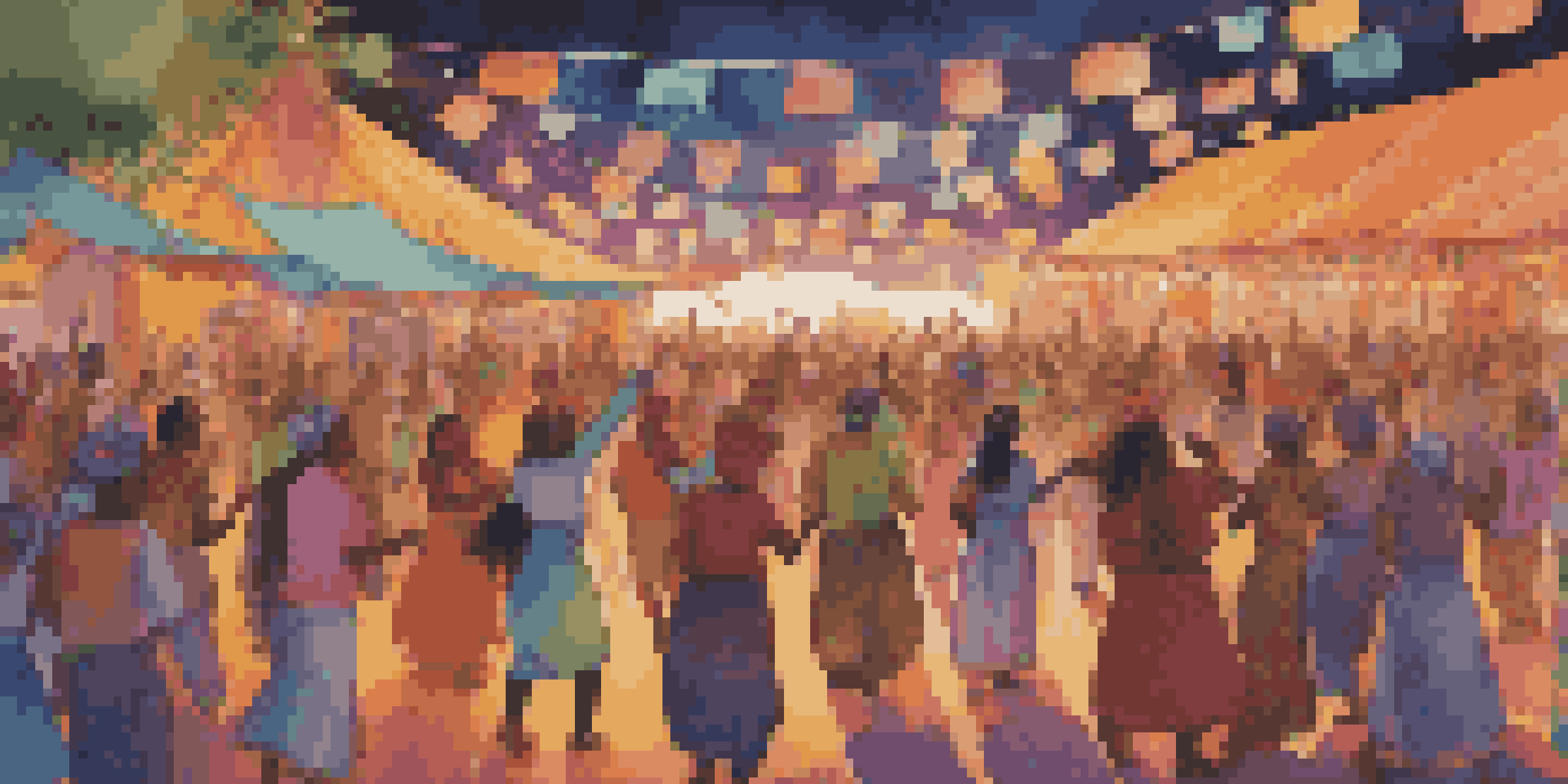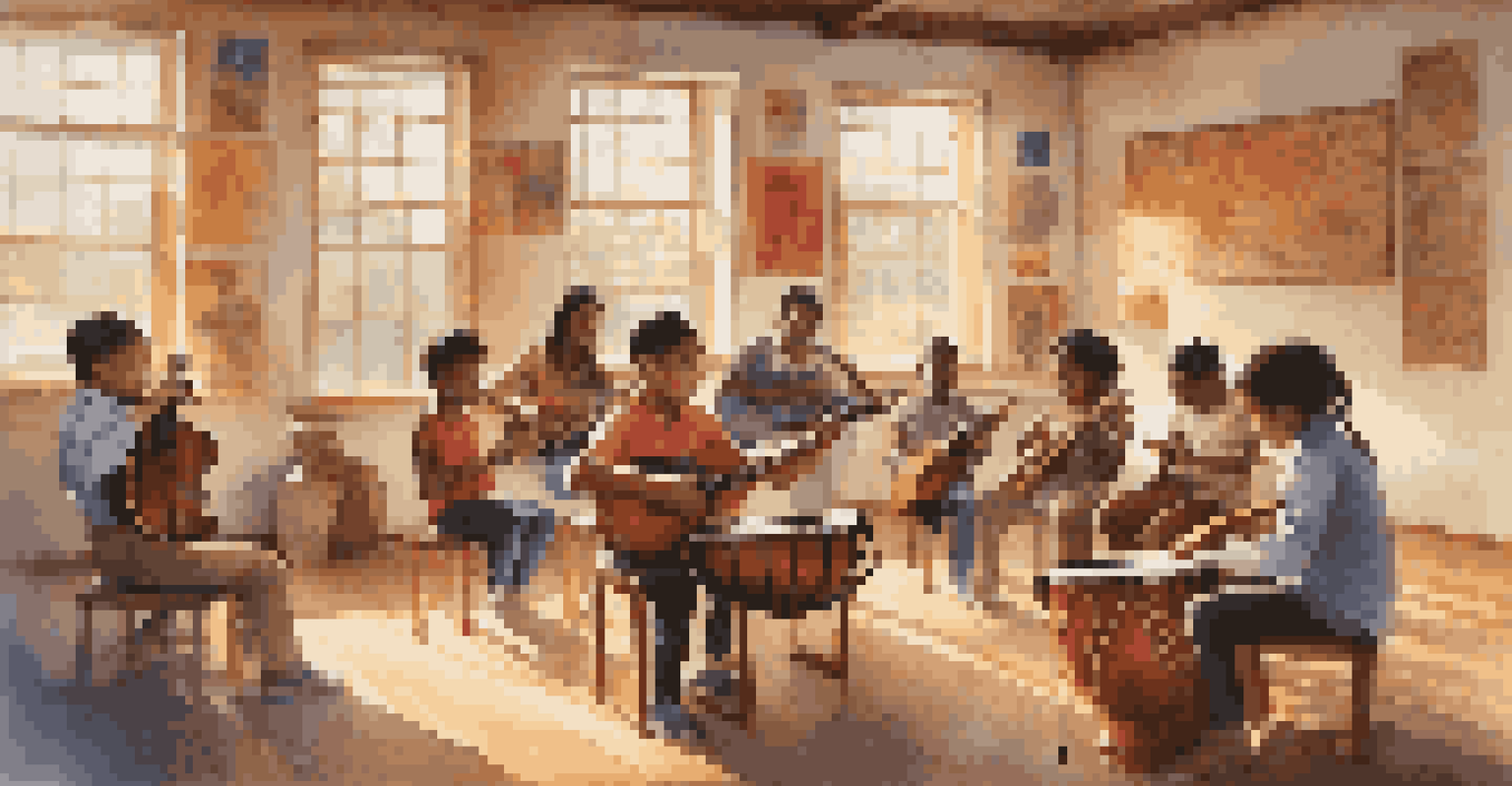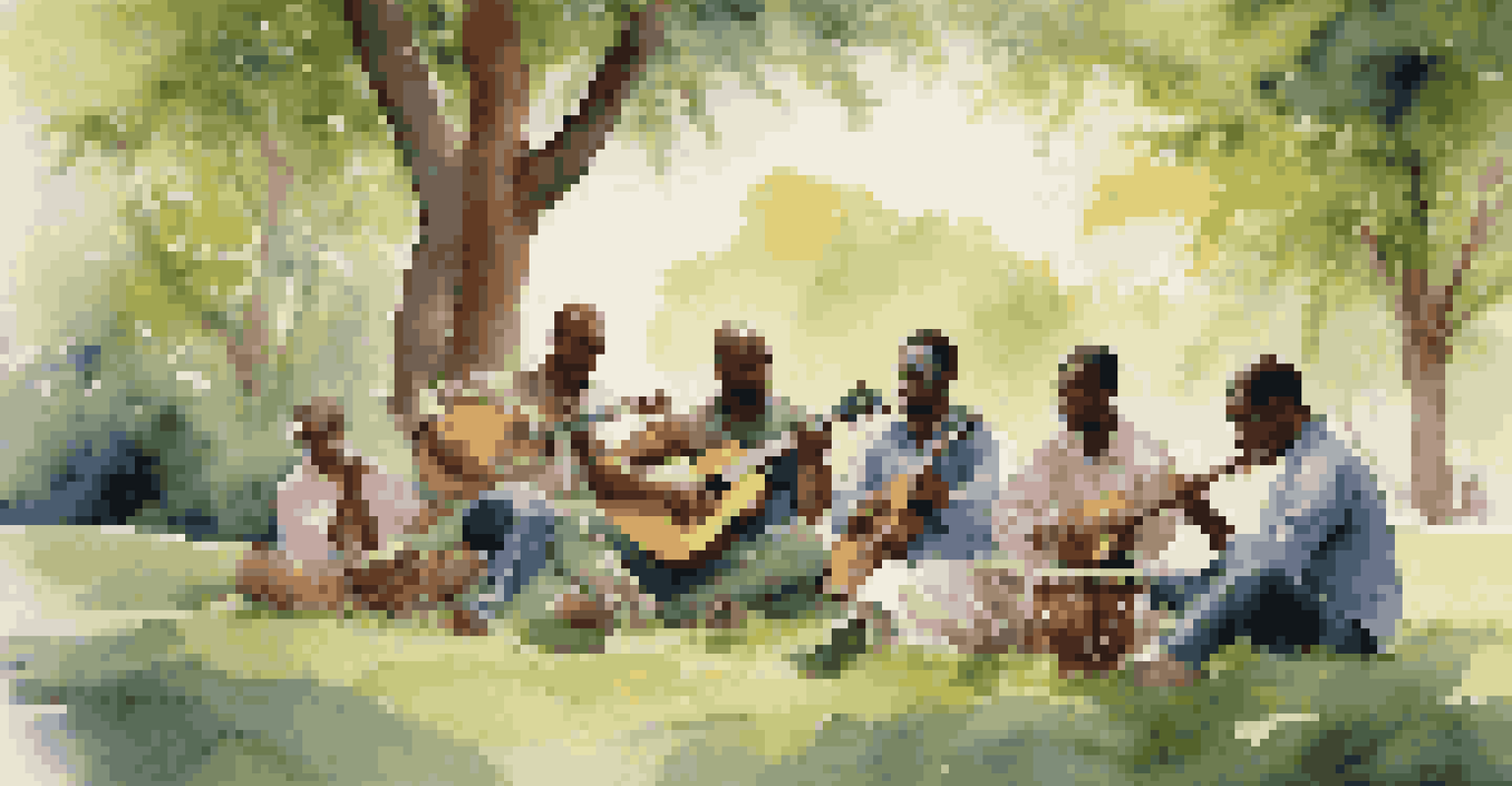The Role of Music in Fostering Cross-Cultural Connections

Music as a Universal Language that Bridges Cultures
Music is often described as a universal language, transcending barriers of speech and nationality. It resonates with emotions that everyone can relate to, regardless of their background. For instance, a joyful melody can make strangers dance together, highlighting our shared humanity.
Music is the universal language of mankind.
This inherent ability of music to evoke feelings and memories enables it to connect people from different cultures. A simple rhythm can spark a sense of familiarity, making it easier for individuals to bond over shared experiences. Think about how a catchy tune can have you humming along, even if it’s in a language you don’t speak.
As music travels across borders, it creates a space for dialogue and interaction. This exchange fosters appreciation and curiosity about other cultures, encouraging people to learn more about each other through their musical traditions.
Cultural Exchange Through Music Festivals and Events
Music festivals serve as vibrant hubs of cultural exchange, bringing together artists and audiences from diverse backgrounds. Events like Coachella or Glastonbury not only showcase popular music but also feature acts from various cultures, promoting inclusivity. Attendees often find themselves immersed in new sounds and traditions, sparking interest in unfamiliar genres.

These gatherings create opportunities for collaboration, where musicians blend their styles, resulting in unique fusions that reflect the beauty of diversity. Imagine a band that mixes reggae with traditional Irish folk music—this not only entertains but also educates listeners about different cultural heritages.
Music Connects Diverse Cultures
Music transcends language barriers, fostering emotional connections and shared experiences among people from different backgrounds.
Moreover, these events foster a sense of community, as people bond over shared experiences and new discoveries. The connections made at music festivals can lead to lasting friendships, as individuals celebrate their differences while finding common ground through the universal love of music.
The Role of Music in Social Movements and Activism
Throughout history, music has played a significant role in social movements, uniting people under a common cause. Songs of protest, like Bob Dylan's 'Blowin' in the Wind,' have inspired generations to stand up for justice and equality. Music not only amplifies messages but also evokes emotions that drive collective action.
Without music, life would be a mistake.
As movements gain momentum, the integration of diverse musical styles can attract a wider audience. For example, hip-hop has become a powerful voice in social justice, merging cultural narratives and creating solidarity among different communities. This blending of genres showcases how music can reflect and support the complexities of societal issues.
In essence, music acts as a rallying cry, encouraging individuals from various backgrounds to come together and advocate for change. The shared experience of singing or listening to powerful anthems fosters unity, reminding us that we are stronger when we stand together.
Music Education as a Tool for Cultural Understanding
Incorporating music education into school curricula can significantly enhance cultural understanding among students. Learning about different musical traditions not only broadens musical horizons but also fosters appreciation for the diversity around us. For instance, studying African drumming can open discussions about its cultural significance and history.
Engaging in hands-on activities, like learning to play instruments from various cultures, allows students to experience music in a personal way. This experiential learning encourages them to explore and respect different cultural practices, creating a more inclusive environment. Just think about how much more connected students feel when they play a piece of music that has historical roots in another culture.
Festivals Promote Cultural Exchange
Music festivals serve as vibrant platforms for cultural exchange, where diverse artists and audiences come together to celebrate and learn from each other.
Moreover, music education can spark curiosity and encourage students to connect with peers from different backgrounds, fostering friendships based on shared interests. By understanding and appreciating the stories behind the music, students develop empathy and a deeper connection to the world around them.
The Influence of Technology on Cross-Cultural Music Sharing
The advent of technology has revolutionized how we share and experience music across cultures. Streaming platforms like Spotify and YouTube allow users to access a plethora of global music, breaking down geographical barriers. This easy access means that listeners can explore a diverse range of sounds from the comfort of their homes.
Social media plays a crucial role as well, enabling artists to share their work with a global audience instantly. Platforms like TikTok have given rise to viral trends, where users adopt and remix music from around the world, promoting cultural exchange in a fun and engaging way. For example, a traditional Indian dance can be combined with a popular pop song, showcasing the beauty of cross-cultural creativity.
As technology continues to evolve, the potential for cross-cultural connections through music grows exponentially. Virtual concerts and collaborations allow fans from different countries to unite in appreciation of their favorite artists, fostering a sense of global community that transcends borders.
Exploring the Impact of Globalization on Music Traditions
Globalization has significantly influenced music, reshaping traditional sounds and styles around the world. While this process can lead to the fusion of genres, it also raises concerns about cultural appropriation and the preservation of authentic musical traditions. As popular music becomes increasingly homogenized, it’s crucial to find a balance between innovation and respect for cultural roots.
Artists often draw inspiration from various cultures, blending elements to create new sounds. For instance, K-pop has gained immense popularity by incorporating Western pop, hip-hop, and traditional Korean music, showcasing the power of cross-cultural collaboration. This kind of fusion not only entertains but also serves to educate listeners about the richness of different musical heritages.
Music Empowers Social Movements
Throughout history, music has united individuals in social movements, amplifying messages and fostering collective action for change.
However, as music evolves, it’s essential to ensure that local voices and traditions are not overshadowed. Supporting and promoting indigenous artists allows them to share their stories and preserve their cultural identity while engaging with global audiences.
The Emotional Resonance of Music Across Cultures
Music holds a unique power to evoke emotions, often creating connections that words cannot express. Regardless of cultural background, people can relate to themes of love, loss, joy, and hope found in music. For instance, a heart-wrenching ballad can resonate deeply with listeners, drawing them together in shared feelings, even if they speak different languages.
The emotional impact of music can also serve as a bridge during challenging times. National anthems, for instance, can instill a sense of pride and unity among citizens, fostering a collective identity. This emotional connection reminds us that, at the core, we all share similar feelings and experiences, despite our differences.

Ultimately, the emotional resonance of music reinforces the idea that we are all part of a larger human experience. By celebrating the emotions conveyed through music, we can cultivate understanding and compassion across cultures, enriching our collective journey.